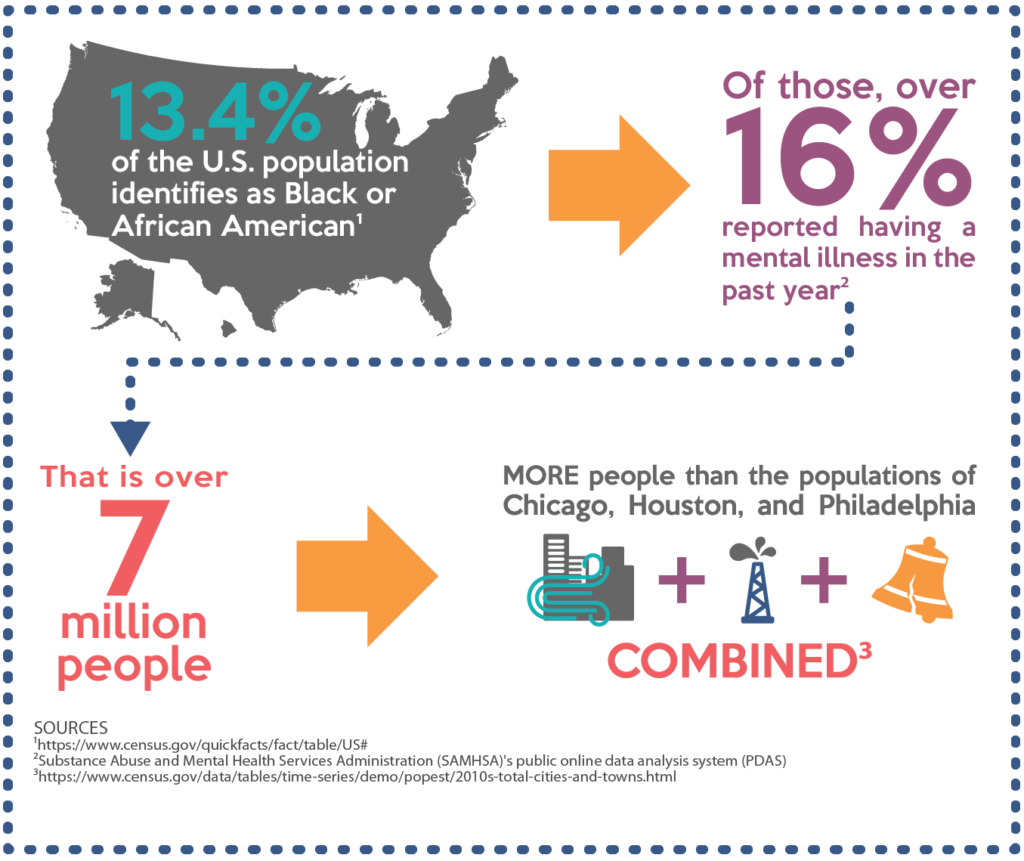February is Black History Month, a time to recognize the struggles and triumphs of African-Americans throughout U.S. history. Historical oppression and violence has resulted in a myriad of mental health disparities in the Black community, including a mistrust of the medical system and lack of adequate access to mental health resources. Between the COVID-19 pandemic, images of police brutality constantly in the media and, divisive political rhetoric surrounding race on top of individual traumas, it is a particularly difficult time for Black and African Americans to process and manage mental heath.
A study conducted by the CDC in 2018 found that:
- African Americans are less likely to receive appropriate diagnoses and treatment for depression and are more likely to have depression for long periods of time
- 58.2 percent of Black and African American young adults 18-25 and 50.1 percent of adults 26-49 with serious mental illness did not receive treatment.
- Nearly 90 percent of Black and African American people over the age of 12 with a substance use disorder did not receive treatment.
In an effort to address the disparities in mental health amongst Black and African American communities, we have compiled a list of resources below. To begin counseling services at Jewish Family Service of Greater Dallas, call (972) 437-9950 x340.
Mental Health Resources for Black and African American Communities
American Psychiatric Association www.healthyminds.org
Black Psychiatrists of America www.bpainc.org
Substance Abuse and Mental Health Services Administration www.samhsa.gov/index.aspx
National Association of Black Social Workers www.nabsw.org/mserver
National Institute of Mental Health www.nimh.nih.gov/health/topics/index.shtml
National Suicide Prevention Lifeline www.suicidepreventionlifeline.org
The Association of Black Psychologists www.abpsi.org
Black Emotional and Mental Health (BEAM): BEAM is a training, movement building and grant making organization dedicated to the healing, wellness, and liberation of Black communities. BEAM envisions a world where there are no barriers to Black Healing.
The Boris Lawrence Henson Foundation: changing the perception of mental illness in the African-American community by encouraging people to get the help they need; focuses on stigma/self-stigma reduction and building trust between Black people and the mental health field.
Resource Guide: directory of mental health providers and programs that serve the Black community; includes therapists, support groups, etc, but also digital content, faith-based programs, educational programs, etc
Therapy for Black Girls: online space encouraging the mental wellness of Black women and girls; referral tool to find a therapist in your area
Therapist Directory: find trusted therapists that can help you navigate being a strong, Black woman; can search for in-office therapist by your location or virtual therapist.
The Loveland Foundation: financial assistance to Black women & girls seeking therapy
Therapy for Black Men: primarily a therapist directory for Black men seeking therapy; includes some resources and stories.
Dr. Ebony’s My Therapy Cards: self-exploration card deck created by a Black female psychologist for other women of color; created with the intention of helping other women of color grow and elevate in the areas of emotional and mental health.
Innopsych: InnoPsych’s mission is to bring healing to communities of color by changing the face and feel of therapy. They strive to make therapists of color more visible in the community by creating a path to wellness-themed business ownership; to make it faster (and easier) for people of color to match with a therapist of color; and to create a major shift in how communities of color (or POCs) view therapy.
Safe Black Space: Safe Black Space is the umbrella under which various services are offered to address people of African ancestry’s individual and community reactions to cultural and racial trauma.


